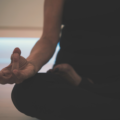
The 4 Pillars of Health
Let’s Chat About the 4 Pillars of Health
Hi everyone!
I want to talk about something foundational. It’s not anything fancy or revolutionary, but it’s truly what everything else stands on — the 4 Pillars of Health. These are: sleep, nutrition, movement, and stress management. I know that they might sound basic or obvious, they are so often overlooked.
In clinic, I always come back to these with patients — because when even just one of these is out of balance, the ripple effects show up everywhere in the body. And in Chinese medicine, we always look at the body as a whole. Nothing happens in isolation.
Let’s take a closer look at each.
1. Sleep
This one is non-negotiable. Sleep is when the body restores, detoxifies, and recalibrates. It’s when our bodies are at complete rest giving it time to digest and recover. Poor sleep can disrupt hormones, immune function, digestion, mood, and more. Research has shown that sleep deprivation impairs cognitive functions, including the ability to regulate emotions effectively. A 2023 study published in the Journal of Applied Physiology found that even short-term sleep restriction impairs vascular function and increases sympathetic nervous system activity—both of which raise cardiovascular risk. And it’s not just about the heart. A 2019 review in Nature and Science of Sleep confirmed that chronic sleep deprivation increases the risk of hypertension, obesity, type 2 diabetes, and systemic inflammation. If you’re tired but wired, waking frequently, or dragging yourself through the day, it’s a clear sign something needs rebalancing.
2. Nutrition
We know this one gets hammered home all the time, but for good reason. Nutrition is the cornerstone of long-term health and is one of the leading global drivers of chronic disease. According to the Global Burden of Disease Study, poor diet contributes to more deaths worldwide than any other risk factor—including smoking. Diets low in fruits, vegetables, whole grains, and omega-3s, and high in sodium and ultra-processed foods, were found to be strongly associated with cardiovascular disease, diabetes, and certain cancers.
In Chinese medicine, we look at food not just as fuel but as therapy—every meal either builds or depletes your Qi. And importantly, food should be sustainable and joyful. That means real food, diverse colours, a mix of temperatures and flavours, and enough flexibility to enjoy the occasional treat without guilt. The goal is to nourish your body, support digestion and mood, and make it realistic and achievable—because extreme or restrictive diets don’t last and often do more harm than good. We need to fuel ourselves with balanced meals that suit our body and lifestyle — not a one-size-fits-all approach.
3. Movement
This doesn’t mean smashing HIIT classes every day. It means moving your Qi. That could be walking, dancing, stretching, swimming—whatever gets your body circulating and makes you feel good. Regular exercise has been shown to confer multiple health benefits and better survival rates. It’s been shown that moderate-intensity exercise sustains the major hallmarks of health and serves as a protective strategy to maintain health in response to stress. When we stagnate physically, we stagnate emotionally too. Stuck Qi is one of the most common patterns I see in clinic—often manifesting as PMS, irritability, tight shoulders, or headaches.
4. Stress Management
Modern life is a lot. Chronic stress is a huge driver of hormonal imbalances, digestive issues, poor sleep, and burnout. In Chinese medicine, stress is often seen through the Liver. When that flow gets blocked? We feel it. Mood swings, irregular periods, tension, reflux, skin flares — the list goes on. Unfortunately, our body can’t tell the difference between the different stressors in our life and it doesn’t moderate the body’s response accordingly. That means that our body will physiologically respond the same way to a tiger standing in front of us, or a stressful work day or a really high intense workout. We need to be able to manage the stressors that we face to allow our nervous system to calm down when the time comes.
When these pillars are strong, we feel resilient. When one or more are shaky, the body compensates for a while — but eventually, it starts to show signs of strain. That’s when symptoms creep in.
So before we dive into complex protocols or fancy supplements, we always come back to the basics.
- Are you sleeping well?
- Are you fuelling your body in a sustainable way?
- Are you moving regularly?
- Are you managing your stress?
And if not — that’s okay. It’s about awareness and gentle course correction. That’s where acupuncture, herbs, and realistic lifestyle tweaks can help guide you back into balance.
Book an appointment to support your body and its 4 pillars!
– Zoe

Research papers
- Iosia-Ryan RA et al. (2023). Sleep restriction impairs vascular function and increases sympathetic activity: implications for cardiovascular health. Journal of Applied Physiology, 135(4), 827–836. ?PubMed
- Medic G, Wille M, Hemels ME. (2017). Short- and long-term health consequences of sleep disruption. Nature and Science of Sleep, 9, 151–161. ?SCIRP
- GBD 2017 Diet Collaborators. (2019). Health effects of dietary risks in 195 countries, 1990–2017: a systematic analysis. The Lancet, 393(10184), 1958–1972. ?
- Eichelberger TD, Munoz DW, Harbin AC, Galpin AJ. (2023). Muscle hypertrophy and strength adaptations from low-load blood flow-restricted and high-load resistance training are comparable in healthy young men. Journal of Applied Physiology, 134(2), 315–326. ?




